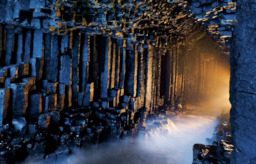
Part I - A Newly Minted Scholar
From the files of Prof. Crimson Tome at Maneskatonic University:
It is with great trepidation that I take up my quill once more to add a new, and final, entry in a journal that I have not touched for longer than I care to remember. Yet now, in the twilight of my years, I feel compelled to explain – if only to some unknown reader – the reason for why I have never taken a student as my protégé save for one young stallion whom I retained many years ago. Perhaps I also feel the need to unburden myself of the terrible knowledge that I have steadfastly kept from all those around me. Perhaps, after I have written as much as my aged hoof can bear, my nights will no longer be haunted by visions of that unfathomable terror stalking the dark reaches of the Everfree.
As a newly minted scholar at the prestigious Maneskatonic University, my interests and endeavors always tended toward the ancient and, often, esoteric. Having written my dissertation on pre-diarchal Equestrian history, I found myself fascinated by the many tales of ancient civilizations and obscure factions that invariably derived from some half-forgotten oral history and then slowly passed into local myth and legend. In the pursuit of my passion, I often spent many nights under the stars, sitting around crackling campfires and listening to the strange and shadowy recollections of some aged, degenerated mare or stallion. And where my contemporaries would dismiss these stories as mere ramblings of a feeble mind, I was of the concerted belief that behind every barely remembered yarn and half-articulated tale, there lay a grain of truth to uncover.
In my fifth year at the University, I was granted a small classroom in which to conduct lessons on early Equestrian history, the trustees being of the mind that demand for such a class would be low. Much to their chagrin – I’d like to think – the course was oversubscribed three times in the first semester, and within a year I was rewarded with a large lecture hall in which to thrill my students with stories of alicorn cast-offs, slumbering elder dragons, and other such colorful fare.
The most esoteric of my material, however, I withheld from my rapt weekly audience, judging it too untested for presentation before eager young minds. But where the absence of certainty reigned, I thrived on the mere possibilities. Back then my free time was dedicated to unraveling the cryptic details of these stories and, where necessary, performing my own investigations to ascertain the truth (or, often, fiction) behind the many campfire tales that I would pick up on my travels.
In my seventh year, pushed by certain of my colleagues, I began searching for a like-minded student to take along on expeditions. Understand that I had no intention of taking an apprentice, finding that aspiring scholars – whether because of naiveté or sheer exuberance – tended to get underhoof more often than not. Nonetheless, my concerns were ameliorated by the benefits I could see from having a companion on my trips. Consequently, as the pleasant days of spring gave way to the summer heat, I offered my most promising student at the time a research position until classes resumed in the fall.
My new assistant was Clever Flanks, a name that I was not particularly thrilled by and he even less so. Nonetheless, he had proven to be the most able of my students and jumped at the chance to “get his hooves dirty,” as he put it. We scheduled a bi-weekly meeting where he and I would pore over reams of notes, journals, and parchments in an attempt to piece together some of Equestria’s long-forgotten mysteries. When we found promising leads, we would conduct interviews, perform on-site inspections, and huddle together at our next meeting to review our findings. With the help of Mr. Flanks, that summer we were able to confirm the route taken by the Hayzikites, a nomadic tribe of pegasi that were said to have split from the main pegasus society over unnamed (and some say macabre) religious practices. I won’t hesitate to admit that I became rather fond of Mr. Flanks, and regarded his scholarly progress with something approaching fatherly pride. Perhaps struck by some excess of sentimentality, then, I allowed him to extract from me a promise that he could rejoin me on expeditions the following summer.
The year that followed – my eighth as a scholar in the University – proved to be the turning point of my career at Maneskatonic.
